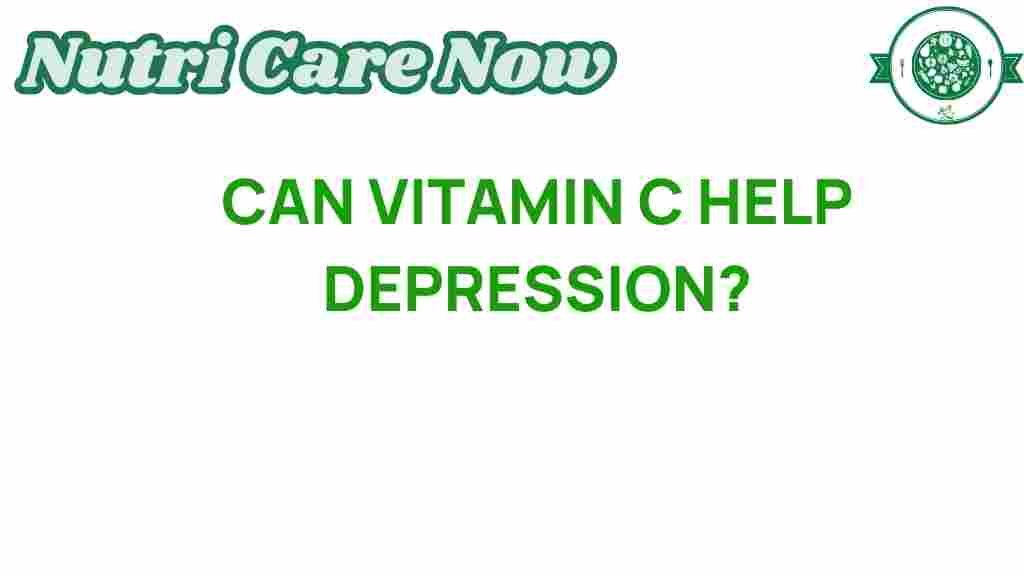The Surprising Link Between Vitamin C and Depression Relief
In recent years, the growing body of research has unveiled intriguing connections between nutrition and mental health. Among the various nutrients that play a role in our psychological well-being, vitamin C stands out, not just for its physical health benefits but also for its potential in mood enhancement and depression relief. This article explores the surprising link between vitamin C and depression, shedding light on how this essential vitamin can contribute to overall wellness.
Understanding Vitamin C and Its Importance
Vitamin C, also known as ascorbic acid, is a water-soluble vitamin that is crucial for various bodily functions. It acts as a powerful antioxidant, protecting our cells from damage caused by free radicals. This vitamin is vital for the synthesis of collagen, the healing of wounds, and the maintenance of healthy skin. Beyond these physical attributes, vitamin C is increasingly recognized for its role in mental health.
The Connection Between Vitamin C and Depression
Depression is a complex mental health condition that affects millions worldwide. Symptoms can range from persistent sadness and loss of interest in activities to fatigue and difficulty concentrating. While various factors contribute to depression, including genetics and environmental influences, nutrition is an area receiving significant attention.
Research suggests that a deficiency in vitamin C may be linked to an increased risk of mood disorders, including depression. Here’s how vitamin C may influence mental health:
- Antioxidant Properties: Vitamin C’s role as an antioxidant helps combat oxidative stress, which has been associated with the development of depression.
- Neurotransmitter Regulation: It assists in the synthesis of neurotransmitters like serotonin, which regulates mood and emotional well-being.
- Immune Function: A healthy immune system can influence mental health, and vitamin C plays a crucial role in supporting immune function.
How Vitamin C Contributes to Mood Enhancement
The potential of vitamin C as a mood enhancer is supported by various studies. For instance, a study published in the journal Nutrients highlighted that individuals with higher vitamin C levels reported lower levels of anxiety and depression.
Here are a few ways vitamin C may enhance mood:
- Boosting Energy Levels: Vitamin C can help combat fatigue, a common symptom of depression, thereby indirectly improving mood.
- Reducing Stress: Adequate vitamin C intake may lower levels of cortisol, the stress hormone, leading to better stress management.
- Improving Cognitive Function: Vitamin C supports brain health, which is essential for maintaining focus and clarity, often impaired in individuals with depression.
Incorporating Vitamin C into Your Diet
To harness the benefits of vitamin C for mental health, it’s essential to include it in your daily nutrition. Here’s a step-by-step guide to increasing your vitamin C intake:
Step 1: Know Your Sources
Vitamin C is abundant in various fruits and vegetables. Some excellent sources include:
- Oranges
- Strawberries
- Kiwis
- Bell peppers
- Broccoli
- Brussels sprouts
- Tomatoes
Step 2: Plan Balanced Meals
Incorporate vitamin C-rich foods into your meals. For example:
- Start your day with a smoothie made from oranges, spinach, and kiwi.
- Add bell peppers to your salads or stir-fries.
- Snack on strawberries or citrus fruits throughout the day.
Step 3: Consider Supplements
If you find it challenging to get enough vitamin C through diet alone, consider vitamin C supplements. However, consult with a healthcare provider before starting any new supplement regimen to ensure it’s appropriate for your individual needs.
Possible Challenges and Troubleshooting Tips
While increasing your vitamin C intake can be beneficial, some individuals may encounter challenges. Here are some troubleshooting tips:
- Difficulty Eating Fruits and Vegetables: If you struggle to consume fresh produce, try juicing or blending them into smoothies to enhance palatability.
- Gastrointestinal Issues: Some people may experience digestive discomfort from vitamin C supplements. Opt for chewable or buffered versions, or spread out the dosage throughout the day.
- Identifying Deficiency: If you’re concerned about your vitamin C levels, discuss testing options with your healthcare provider.
Beyond Vitamin C: A Holistic Approach to Mental Health
While vitamin C plays a significant role in mental health, it’s essential to recognize that wellness is multi-faceted. Here are additional strategies to support mental well-being:
- Balanced Nutrition: Incorporate a variety of vitamins and minerals into your diet.
- Regular Exercise: Physical activity releases endorphins, which can improve mood.
- Mindfulness Practices: Techniques such as meditation and yoga can help reduce stress and anxiety.
- Quality Sleep: Prioritize sleep hygiene for better mental and emotional health.
Conclusion
The link between vitamin C and depression relief is an exciting area of research that underscores the importance of nutrition in mental health. By incorporating vitamin C-rich foods into your diet and considering supplements if necessary, you can take proactive steps towards enhancing your mood and overall wellness. Remember, while vitamin C is beneficial, a holistic approach that includes a balanced diet, regular exercise, and mindfulness practices is key to maintaining mental health.
For more information on wellness and nutrition, explore our articles on nutrition and mental health.
Embrace the power of vitamins and antioxidants like vitamin C, and unlock the potential for improved mood and mental well-being!
This article is in the category Supplements and created by NutriCareNow Team
